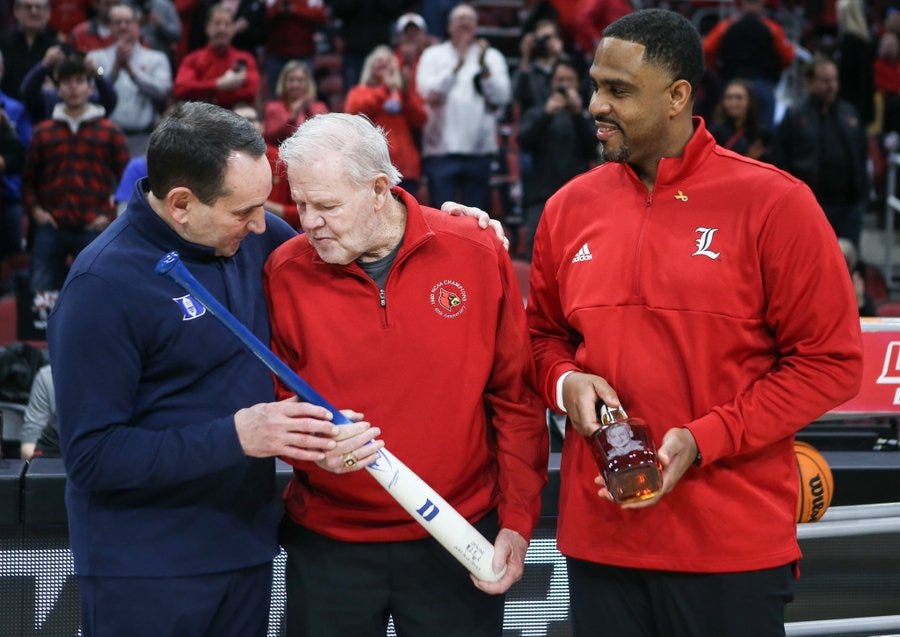

Duke’s Mike Krzyzewski gets emotional talking about Denny Crum, Louisville basketball
Duke head coach Mike Krzyzewski says “the Louisville program is one of the all-time best” after being honored by Denny Crum and Mike Pegues before game.
Matt Stone, Louisville Courier Journal
To say Denny Crum is Louisville basketball seems like it doesn’t encompass just how important he was. He made it OK to dream big at Louisville.
Crum died Tuesday at the age of 86. During his 30 years leading the Cardinals, he single-handedly raised the level of expectations for how athletics could lift what was once primarily viewed as an urban, commuter university and little brother to the school in Lexington.
He was the source of pride for the Cardinals, taking a good program — at the age of 34 with no previous head coaching experience — and making it great. Often while wearing a red sport coat and clutching a rolled-up program on the sideline.
He simply recruited to his style wherever that took him and played a disciplined, fast-paced brand of basketball that saw immediate success. Crum took the Cards to the Final Four his first season at the helm in 1972 and kept that bar high for two decades.
Louisville made four Final Four appearances and won national titles in 1980 and 1986 during a seven-season span from 1980-86. That was the most dominant span by a coach in the past 43 years with the exception of Duke’s Mike Krzyzewski (six Final Fours from 1988-94 including 1991-92 titles), who Crum beat in the 1986 title game.
Crum stayed around for 30 seasons. Considering how his tenure ended, maybe that was too long. But he had a loyalty to Louisville, despite having ample opportunities to leave.
CRUM REACTIONS: ‘His impact will last forever’: Sports world mourns former Louisville coach
Had he left after reaching his second Final Four in 1975, who knows if the Cardinals’ program would have developed the way it did. But he wanted to see it through, despite the desperate tugs from his alma mater.
UCLA was clamoring to find a John Wooden replica and thought Crum could be the one.
By the second time the Bruins approached him in 1977, the California native who played for Wooden and served as his assistant coach had already become a Louisvillian at heart. He owned a 55-acre farm and appreciated the laid-back lifestyle in the Commonwealth as opposed to the hustle of Hollywood.
The only thing Louisville fans like more than a coach staying loyal is one that doesn’t cower to Kentucky. Crum happened to have both traits.
His overall record against the Cats was just 7-13. But he won the one that mattered most, and that first meeting paved the way for everything else.
The Louisville and Kentucky series had big gaps — from 1922 to 1948 and again from 1959 to 1983 — where they didn’t play each other. Kentucky’s legendary coach Adolph Rupp had an unwritten policy of not scheduling the Cardinals, and that continued even after Joe B. Hall took over.
MEMORABLE MOMENTS: Five favorites from Denny Crum’s Hall of Fame coaching career
It wasn’t just a preference for out of state opponents, there was the sense that the Wildcats were above playing Louisville. Like the Cards hadn’t been good enough for long enough to play the undisputed kings of the Bluegrass and one of the established bluebloods of college basketball.
So when the teams were set to meet in 1983 during the NCAA Tournament in Knoxville, Tennessee, the hype was unprecedented. The fact that the winner earned a spot in the Final Four was almost an afterthought. It quickly took on the moniker of the “Dream Game” in the Commonwealth.
When Crum led Louisville to an 80-68 win in overtime of the Mideast Region final, that dream created a new reality. The Cards weren’t going to stand for that ‘little brother’ talk any more. They were equals and should be treated as such.
CRUM LEGACY: Pervis Ellison, Kenny Payne and other players he coached to NBA first-round picks
It was arguably the biggest victory, certainly the most important one, that wasn’t for a national championship in program history.
Because of that game, then Gov. John Y. Brown brokered a deal between the schools that led to renewing the series. And the teams have played annually ever since.
Crum’s impact at Louisville went well beyond what he achieved on the basketball court.
There was a time at the height of his popularity in the 80s when Crum was asked to speak in Central City, essentially in the heart of Kentucky country, to a rotary club to raise money for scholarships.
He drove himself, stayed with the family that invited him to Muhlenberg County, and eventually helped establish an athletic scholarship to Louisville. Those are the kinds of gestures Crum made that people remembered as they mourned his death Tuesday.
They don’t talk about the last part of his career, when the NCAA investigators rolled up on campus and he suffered his only three losing seasons in his final 11 years at the helm.
They remember how great the big wins and national titles felt. And how, thanks to Denny Crum, it was no longer just a dream.
